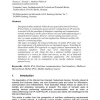Free Online Productivity Tools
i2Speak
i2Symbol
i2OCR
iTex2Img
iWeb2Print
iWeb2Shot
i2Type
iPdf2Split
iPdf2Merge
i2Bopomofo
i2Arabic
i2Style
i2Image
i2PDF
iLatex2Rtf
Sci2ools
115
click to vote
CORR
2004
Springer
2004
Springer
Roaming Real-Time Applications - Mobility Services in IPv6 Networks
Emerging mobility standards within the next generation Internet Protocol, IPv6, promise to continuously operate devices roaming between IP networks. Associated with the paradigm of ubiquitous computing and communication, network technology is on the spot to deliver voice and videoconferencing as a standard internet solution. However, current roaming procedures are too slow, to remain seamless for real-time applications. Multicast mobility still waits for a convincing design. This paper investigates the temporal behaviour of mobile IPv6 under realtime requirements with dedicated focus on topological impacts. Extending the hierarchical mobile IPv6 approach we suggest protocol improvements for a continuous handover, which may serve bidirectional multicast communication, as well. Along this line a multicast mobility concept is introduced as a service for clients and sources, as they are of dedicated importance in multipoint conferencing applications. The mechanisms introduced do not rely ...
Related Content
| Added | 17 Dec 2010 |
| Updated | 17 Dec 2010 |
| Type | Journal |
| Year | 2004 |
| Where | CORR |
| Authors | Thomas C. Schmidt, Matthias Wählisch |
Comments (0)

